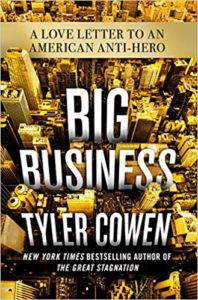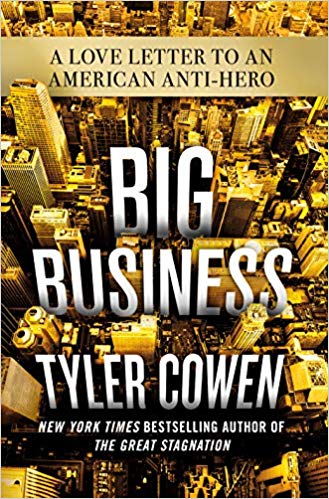
Tyler Cowen’s latest book, Big Business: A Love Letter to an American Anti-Hero, is excellent. Cowen, an economics professor at George Mason University, makes a strong evidence-based case that big business in America is an important—probably the most important—contributor to our well-being.
In a heavily footnoted book with references to scores of high-quality articles and books, Cowen argues that:
- Businesses are less deceptive than many other actors in society.
- CEOs are not, in general, paid too much.
- Most people like their jobs and often find them a safer haven than their homes
- Big business is not particularly monopolistic.
- Big tech companies are not evil.
- Wall Street and finance companies in general are responsible for much of our prosperity.
- Cronyism by big business is not a major factor in government policy.
His case on each of these is persuasive and, as a bonus, he often has fresh insights and occasionally brings dry humor to his writing. My main criticism is that he is a little too “politically correct” at times.
If I were to lay out all the things I learned from the book, I would almost restate it. Instead, I’ll note some of the best and most insightful arguments.
This is the opening of my “A Love Letter to Tyler Cowen,” my review of Tyler Cowen’s latest book, “Big Business: A Love Letter to an American Anti-Hero,” Regulation, Summer 2019. If you click on the link, which I recommend doing, scroll about half-way down.
Although Tyler is a long-time friend, that has never stopped me from being critical when I thought his work deserved criticism. I was very critical, for example, of his earlier book The Great Stagnation.
This book is head and shoulders above The Great Stagnation. His mastery of the literature is incredible. I’m a footnote reader and found huge value in the footnotes.
One other excerpt:
The biggest surprise, though, is that, as one partner in a Swiss law firm put it, “America is the new Switzerland.” American laws, writes Cowen, have evolved to produce a high level of secrecy for some asset holders in this country. And South Dakota seems to be our own Luxembourg. With only 850,000 people, South Dakota “is home to more than $226 billion in assets held in trusts.”
Who knew?
Read the whole thing.


READER COMMENTS
Alan Goldhammer
Jun 21 2019 at 8:38am
Good review (as is the second one on the Uwe Reinhart healthcare book!). The one area that I disagree with TC is on CEO compensation. As one who regularly votes on named officer compensation during proxy season, I am often appalled at the current compensation system. It’s not just the salaries but all so the other deferred compensation packages. Most BODs are made up of CEO peers and they all embrace the cottage industry of compensation consultants. It’s no wonder that virtually every large company in my portfolio has a similar compensation structure. On some occasions over the years I have voted no on the compensation proposal (remember that this is non-binding so perhaps it is analogous to spitting in the ocean).
Tying compensation to stock price encourages stock buy backs rather than direct distribution to shareholders via dividends or increased investment into R&D (assuming that is necessary). One only needs to examine the perverse incentives that the recent tax law created as foreign holdings came back to the US. Buybacks increased dramatically (no surprise here as those of us who followed the Bush tax repatriation provisions over a decade ago saw the same thing.)
High stock prices in the short term are not an indication of long term corporate performance. The examples you site in a subsequent section on monopolistic control are equally applicable here (I fondly remember the DEC PDP-11 that I programmed as a post-doc at Cornell in the mid-1970s).
robc
Jun 21 2019 at 8:57am
As long as capital gains are taxed less than dividends, buy backs are going to be favored. I don’t think it has as much to do with CEO compensation as you do. However, I am sure that is a factor. However, if dividends were taxed lower, there would be a pushback against any CEO that tried to go with buybacks to enhance their own bottom line.
Alan Goldhammer
Jun 21 2019 at 10:03am
“As long as capital gains are taxed less than dividends, buy backs are going to be favored. I don’t think it has as much to do with CEO compensation as you do.”
It depends on what type of investor you are along with your financial needs. I’m retired and income from dividends is important to me. I tend to hold good stocks for ever as even with the tax preference, a large capital gain is a significant tax liability. Almost every compensation package that I have voted on includes stock price appreciation as part of CEO compensation.
BC
Jun 22 2019 at 2:02pm
“income from dividends is important to me”
A dividend causes the stock price to drop by the amount of the dividend. If there were no taxes and one needed $100 in cash for living expenses, one would be indifferent between (1) the company paying $100 in dividends, causing the ex-div value of one’s stock holdings to drop by $100 and (2) the company paying no dividend and one selling $100 worth of stock, which of course would also reduce the value of one’s stock holdings by $100. In each case, one ends up with $100 in cash and $100 less worth of stock. With taxes, however, the $100 is fully taxable at the dividend tax rate in (1), but only part of the $1oo is taxable at the capital gains rate in (2). One is almost always better off in (2) than in (1).
Vivian Darkbloom
Jun 22 2019 at 12:07pm
Are long term capital gains (currently and since 2003) taxed at lower rates than qualified dividends?
Thaomas
Jun 21 2019 at 11:48am
Stock compensation ought to be based on options to purchase far in the future, not immediately otherwise what’s the point except a tax dodge?
Mark Z
Jun 21 2019 at 8:38pm
How do you know that these marginal product of these CEOs whose compensation you’re voting on isn’t high enough to justify it? Anecdotes about A particular CEO making lots and lots of money isn’t a compelling rebuttal against quantitative empirical evidence that CEOs are on average roughly worth their compensation.
WalterCO
Jun 21 2019 at 2:26pm
As a stockholder, I will have a certain viewpoint on CEO compensation, but much criticism of CEO pay today is coming from the social justice angle. Activists often want to apply limits to executive pay based on what non-execs are being paid, not on anything remotely to do with performance.
Joe Kristan
Jun 21 2019 at 7:01pm
The tax law pushed big companies to rely on “performance based” compensation in 1993 when it enacted a $1 million cap on public corporation deductions for top executives. The regulations under this favored stock option plans, making them relatively easy to qualify for the exception. The logical result was more stock option plans.
The 2017 tax reforms eliminated this “loophole” and applied the $1 million cap more broadly. There is no good policy justification – the executives have to include the income on their returns and pay tax at a higher rate than the value of the deduction to the corporation. As stock price is still a crude but objective and reasonable measure of executive performance, stock plans may remain popular anyway.
An unintended consequence of this provision, tax code Sec. 163(m) that it adds even more to the after-tax expense of going public, which is by itself a bad thing.
It’s not the business of the tax law to tell corporations how, or how much, they should pay their executives. That is a decision made better suited corporate boards than Congressional committees. But here we are.
Comments are closed.